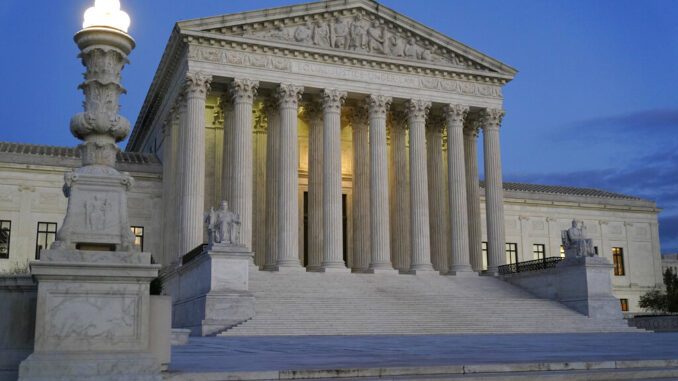
RALEIGH — The U.S. Supreme Court ruled in a pair of cases with big implications for North Carolina in the final week of their term that ended in June.
The court announced its ruling in Moore v. Harper on Tuesday, June 27, largely siding against the plaintiffs in the case which included state legislative leaders in a 6-3 decision.
“The Elections Clause does not carve out an exception to that fundamental principle. When state legislatures prescribe the rules concerning federal elections, they remain subject to the ordinary exercise of state judicial review,” read part of the holding in the decision.
Chief Justice John Roberts delivered the opinion joined by Justices Sonia Sotomayor, Elena Kagan, Brett Kavanaugh, Amy Coney Barrett and Ketanji Brown Jackson. Kavanaugh also filed a concurring opinion. Justice Clarence Thomas wrote a dissenting opinion in the case, which was joined by Justices Neil Gorsuch and Samuel Alito in part.
Initial reports said that plaintiffs, led by the legislative leaders, lost the case. But, in part of his dissent, Justice Thomas noted that the N.C. Supreme Court’s 2023 rehearing essentially made the case before them moot.
“In short, this case is over, and petitioners won. The trial court’s original final judgment in favor of petitioners, affirmed by the State Supreme Court in Harper III, represents ‘the final determination of the rights of the parties’ in this case,” wrote Thomas. “Harper I has been overruled, and plaintiffs-respondents’ claims for relief have been dismissed on adequate and independent state-law grounds. As a result, petitioners’ alternative Elections Clause defense to those claims no longer requires decision; the merits of that defense simply have no bearing on the judgment between the parties in this action. That is the definition of mootness for an issue.”
The decision comes at the N.C. Supreme Court earlier this year vacated rulings from the 2022 court in both redistricting and voter ID. Moore indicated as much in April, telling North State Journal at an event he expects new maps for the 2024 elections for Congress and both chambers of the General Assembly.
Redistricting litigation is far from over, though.
Philip R. Thomas, a member of Chalmers, Adams, Backer & Kaufman, LLC* and president of Taxpayers for Honest Elections*, told North State Journal the decision leaves open many questions about where the line is to be drawn, which will result in additional elections-related litigation going forward.
“This decision confirms that while state judicial review remains part of the process, state courts cannot commandeer the role of state legislatures to impose their will when it comes to federal elections.
(* These comments reflect the personal views of Mr. Thomas and do not necessarily reflect the views of his law firm, its clients, or any other person or organization.)
In a decision announced on Thursday, June 29, affirmative action practices within college admissions were declared unconstitutional in a 6-3 decision.
Roberts also wrote the opinion of the court in this case, which was joined by Thomas, Alito, Gorsuch, Kavanaugh and Barrett. Notably, there were a number of concurring and dissenting opinions, led by strong words by Justices Thomas and Jackson. The court’s two black justices also made a point by reading their entire opinions aloud at the Supreme Court building.
A lawsuit spurred by Students for Fair Admission, a nonprofit membership group of more than 20,000 students, parents and supporters, said racial classifications and preferences in college admissions are unfair, unnecessary, and unconstitutional and sued Harvard and the University of North Carolina at Chapel Hill over their admissions policies.
“A student’s race and ethnicity should not be factors that either harm or help that student to gain admission to a competitive university,” the group said, and prevailed in the case.
The justices agreed, with Roberts writing in part, “Eliminating racial discrimination means eliminating all of it. And the Equal Protection Clause, we have accordingly held, applies “without regard to any differences of race, of color, or of nationality”— it is “universal in [its] application.”
Colleges and universities as a result must reshape admissions practices, with many committing to finding alternate ways to maintain diversity on college campuses.
University of North Carolina System President Peter Hans issued a statement in the case, saying his team was reviewing the decision but will follow the law.
“Our public universities do extraordinary work every day to serve students of all backgrounds, beliefs, income levels and life experiences. The most important work of higher education is not in deciding how to allocate limited admissions slots at highly competitive schools, but in reaching and encouraging more students to take advantage of our 16 remarkable public universities,” said Hans.
“We have permitted race-based admissions only within the confines of narrow restrictions. University programs must comply with strict scrutiny, they may never use race as a stereotype or negative, and— at some point — they must end. Respondents’ admissions systems — however well intentioned and implemented in good faith—fail each of these criteria. They must therefore be invalidated under the Equal Protection Clause of the Fourteenth Amendment,” the Chief Justice added in his opinion.



